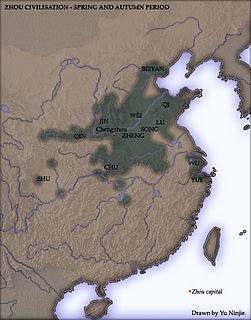
Feudalism was a combination of legal and military customs in medieval Europe that flourished between the 9th and 15th centuries. Broadly defined, it was a way of structuring society around relationships derived from the holding of land in exchange for service or labour. Although derived from the Latin word feodum or feudum (fief), then in use, the term feudalism and the system it describes were not conceived of as a formal political system by the people living in the Middle Ages. The classic definition, by François-Louis Ganshof (1944), feudalism describes a set of reciprocal legal and military obligations among the warrior nobility revolving around the three key concepts of lords, vassals and fiefs.

An oath of fealty, from the Latin fidelitas (faithfulness), is a pledge of allegiance of one person to another.

A fief was the central element of feudalism. It consisted of heritable property or rights granted by an overlord to a vassal who held it in fealty in return for a form of feudal allegiance and service, usually given by the personal ceremonies of homage and fealty. The fees were often lands or revenue-producing real property held in feudal land tenure: these are typically known as fiefs or fiefdoms. However, not only land but anything of value could be held in fee, including governmental office, rights of exploitation such as hunting or fishing, monopolies in trade, and tax farms.
Gongsun Yuan, courtesy name Wenyi, was a warlord and vassal of the state of Cao Wei during the Three Kingdoms period of China. He rebelled against Wei in 237 and declared himself "King of Yan" (燕王). In 238, the Wei general Sima Yi led forces to Liaodong and successfully suppressed the rebellion.

The foundation and rise of the Ottoman Empire is a period of history that started with the emergence of the Ottoman principality in c. 1299, and ended in 1924. This period witnessed the foundation of a political entity ruled by the Ottoman Dynasty in the northwestern Anatolian region of Bithynia, and its transformation from a small principality on the Byzantine frontier into an empire spanning the Balkans and Anatolia. For this reason, this period in the empire's history has been described as the "Proto-Imperial Era". Throughout most of this period, the Ottomans were merely one of many competing states in the region, and relied upon the support of local warlords and vassals to maintain control over their realm. By the middle of the fifteenth century the Ottoman sultans were able to accumulate enough personal power and authority to establish a centralized imperial state, a process which was brought to fruition by Sultan Mehmed II. The conquest of Constantinople in 1453 is seen as the symbolic moment when the emerging Ottoman state shifted from a mere principality into an empire therefore marking a major turning point in its history.
The Ottoman Empire developed over the centuries a complex organization of government with the Sultan as the supreme ruler of a centralized government that had an effective control of its provinces, officials and inhabitants. Wealth and rank could be inherited but were just as often earned. Positions were perceived as titles such as viziers and aghas. Military service was a key to advancement in the hierarchy.
Suzerainty is any relationship in which one region or polity controls the foreign policy and relations of a tributary state, while allowing the tributary state to have internal autonomy.

Ordensburgs were fortresses built by crusading German military orders during the Middle Ages.

The Liberation of Bulgaria were a series of events in the Russo-Turkish War (1877–1878) that led to the re-establishment of Bulgaria as a Sovereign state under the Treaty of San Stefano of 3 March 1878.

Sid Meier's Civilization IV: Warlords is the first official expansion pack of the critically acclaimed turn-based strategy video game Civilization IV.
Suí was a Zhou dynasty vassal state in the Han River Basin in modern Suizhou, Hubei, China. Its ruling house had the surname Ji (姬), and held the noble rank of Hou (侯), roughly comparable to a marquess.

Ancient Chinese States were typified by variously sized city states and territories that existed in China prior to its unification by Qin Shi Huang in 221 BCE. In many cases these were vassal states characterized by tribute paid to the ruling Zhou dynasty. Such states and fiefdoms would again emerge during later dynasties as a political expedient when required.

The Eastern Zhou was the second half of the Zhou dynasty of ancient China. It is divided into two periods: the Spring and Autumn and the Warring States.
This page is based on this
Wikipedia article Text is available under the
CC BY-SA 4.0 license; additional terms may apply.
Images, videos and audio are available under their respective licenses.







